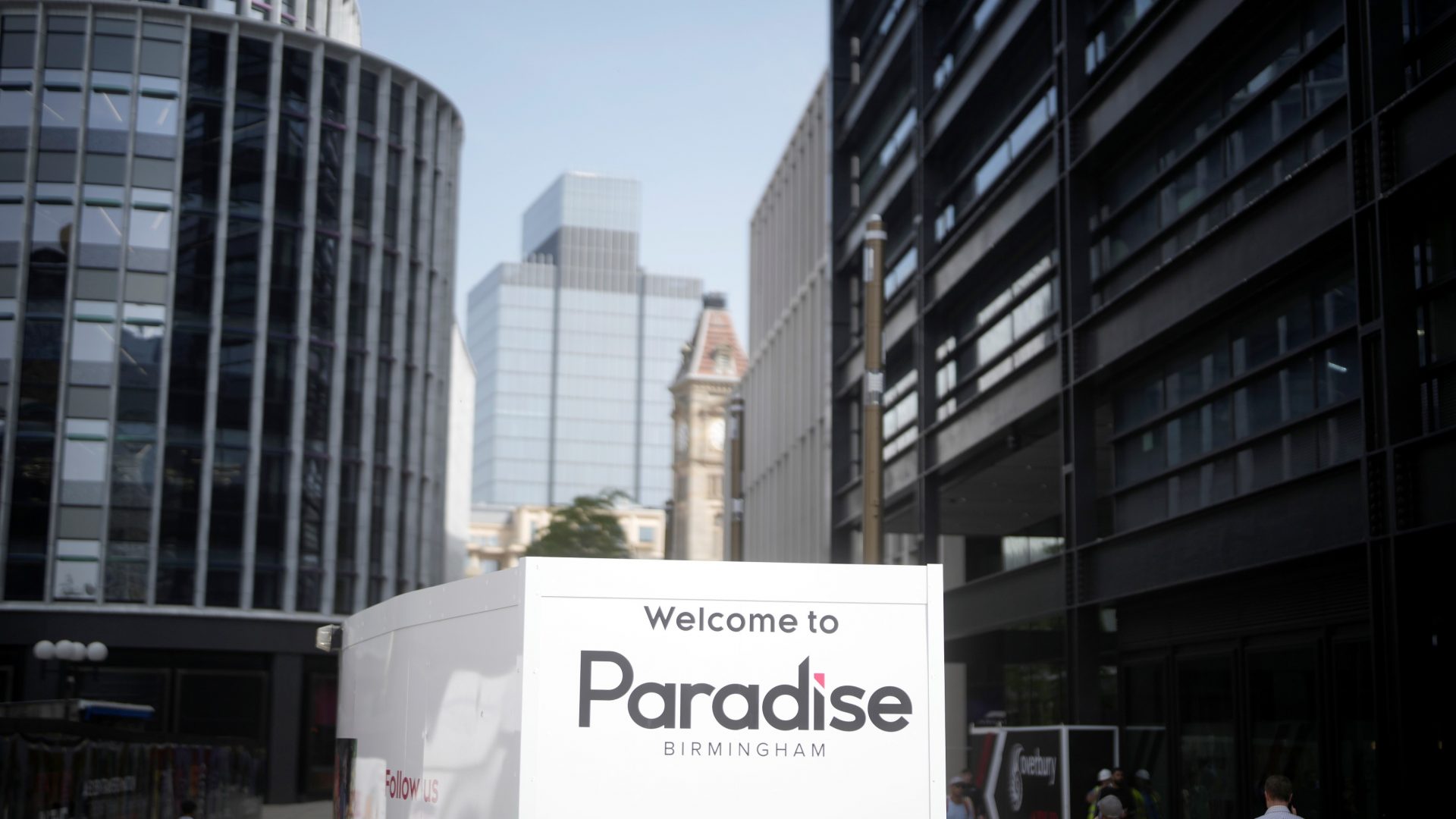“A crumbling land of perpetual slums” by Matthew d’Ancona (TNE #355) is spot on. The UK is falling apart, and not just physically, through failing infrastructure and councils going bankrupt as a result of their real-terms funding being cut by over 40% since 2010 while the demand for their services has increased.
Our failing infrastructure is plain to see in schools, hospitals, other public buildings, housing, transport and water treatment. How much of the investment needed for effective water treatment and effective railways has gone into the pockets of shareholders rather than into maintaining the sewers and improving the capacity and reliability of the trains? Privatisation of essential utilities and services only works if there is strong regulation, conspicuously lacking here.
There is another sense in which the UK as a whole is crumbling – we are morally bankrupt and politically bereft of the courage required to take the action needed to address the UK’s manifold inadequacies. That requires investment, which in turn requires a strong and growing economy.
That is not going to happen until we rejoin the single market and customs union, with controlled freedom of movement and high-quality, flexible vocational training pathways providing the workers our economy desperately needs, alongside a humane asylum system that meets the legitimate needs of desperate people in balance with their net contribution to the economy.
There is no chance of that happening with the current regime, and no common sense or decency either – you won’t hear any government minister say “Yes, we got that wrong. We took the wrong decisions and we need to put it right.” Just don’t stand under any dodgy concrete beams, swim in a river, require urgent medical help or expect your train to arrive on time for at least the next 10 years.
Phil Green
In February 2003, the then schools minister, David Miliband, announced the “rebuilding schools for the future” (BSF) policy to rebuild every secondary school in England, and the Treasury allocated £35bn to achieve it. In 2010, Michael Gove scrapped it, instead using the funds for his Free School initiative.
Numerous schools with building plans and projects were left in limbo, and all the rest left to wait until now to find out why every school needs rebuilding. If there is a political concept equivalent to RAAC, then we have had a government made entirely of it for the last decade.
Paul Stein
Pickering, Yorkshire
While chancellor, Rishi Sunak thought a schedule of rebuilding 50 schools a year was placing the country’s educational infrastructure on a sustainable footing. It surely could not have been lost on him, with all his mathematical ability, that with around 32,000 schools nationally, at that rate of renewal a new school built today would be due for replacement in around 640 years’ time.
David Coombs
Corby, Northants
Fake views
Rather than rely on risky “Divine fakery” as stated in your headline (TNE #355), the forger Han van Meegeren preferred assured divine creativity.
Experts believed that between his early, mainly religious works and his late masterpieces, Jan Vermeer had produced paintings since lost. Van Meegeren proceeded to fill this gap, to the universal endorsement of art historians and dealers. Hermann Göring bought one of these.
Some years ago, the British Museum staged an exhibition of his forgeries. I couldn’t believe that anyone could have agreed that the exhibited kitsch had anticipated Vermeer’s masterpieces.
Adam Czerniawski
Monmouth, Wales
A win for LSO
Mandrake writes (TNE #355) lamenting the end of London’s time “at the heart of musical Europe” that “it is believed to be only a matter of time before Antonio Pappano gives up at the Royal Opera House.” Pappano will take over from Simon Rattle as principal conductor of the London Symphony Orchestra next year. So not all bad.
Colin Matthews
London SW11
After Mandrake’s classical coverage, how gratifying it was to see the wonderful outburst of outgoing patriotism at the Last Night of the Proms on BBC TV. All those EU flags as well as the union flags did my heart good.
Alan Craw
May’s Brexit
Theresa May is now trying to portray herself as a sensible moderate Tory who tried to secure a more consensual and less damaging Brexit deal (Mandrake, TNE #354). This is nonsense.
We should never forget that May could have stopped Brexit had she so chosen. In 2019, when she could not get her Brexit deal through parliament because of the opposition of the hard Brexiteers ERG group in her own party, she could have called a referendum on it, effectively saying: “This is what Brexit entails. It’s the best possible deal we can get. If you want Brexit, vote for it; otherwise we stay in the EU.”
She would have secured a majority for this course of action in the Commons. An amendment for a second referendum had already come close to securing a majority against the opposition of the government. If the government changed its position and supported one, there would easily have been a majority.
It would have been a win-win situation for her: either her deal got approved by the public, or Brexit was abandoned and we stayed in the EU as she had so recently advocated in the first referendum. The rise of Boris Johnson would have been thwarted.
But she didn’t. Instead, she chose to appease the hard Brexiteers rather than act in the national interest.
So, no, Theresa May, you can’t rewrite history. You are as much to blame for Brexit as those from whom you are now trying to disassociate yourself.
Richard Corbett CBE
Former leader of Labour MPs in the European Parliament
Way to rejoin
Re: “The silent majority must be heard” (TNE #354). Rather than switch to openly campaigning to rejoin, wouldn’t it be wiser for a Labour government to hold an official inquiry into this matter, and if it recommends returning to the EU under different conditions compared with last time, then it acts on the recommendations?
Is there any other way of returning to the EU without causing civil war or handing government back to the Tories?
Peter Gavin
I’m afraid that the idea that there are indications of a favourable response from the EU to a future application from Britain to rejoin is pure fantasy. My concern is that the pro-EU lobby will discredit itself by pushing false optimism of this kind.
We should rather concentrate on developing a positive agenda in areas where cooperation is possible; Labour might be a spearhead for this effort (but not until it becomes the government). We failed before 2016 to find the right arguments and that’s a permanent wound; I don’t want a repeat.
Michael Wohl
I fear that the UK is in no fit state to rejoin and that the other EU countries are only too aware of this. After all, it’s not a country like others in the EU but a pantomime horse of a nation – consisting as it does of three countries and six counties detached from a fourth a century ago. The dominance of England unbalances the union, in the way that Serbia unbalanced the former Yugoslavia and Russia the former Soviet Union, and dividing England into arbitrary regions that haven’t existed for centuries if at all is a contrived solution.
Add an incoherent local government structure (single-tier and two-tier authorities randomly distributed across England, along with sporadic mayoralties), the absence of a written constitution and anachronistic remnants such as the House of Lords, and what results is an increasingly failing state that could well fall apart over the next decade or two.
While the structure of the UK was already evident at the time it joined the EU in 1973, the flaws and tensions were much less evident and were no barrier, therefore, to its acceptance. Now I fear that the EU might choose to bide its time, as it is doing with the former Yugoslavia, and that England will be the final component of the former UK to rejoin.
Norman Jope
Plymouth, Devon
Taking credit
Re: “Málaga is game for tech renaissance” (TNE #354). It is the national government, led by Pedro Sánchez, that has managed to negotiate with those tech companies to invest in Spain. Not the provincial government, led by Juanma Moreno of the Andalucían People’s Party. Our country’s opposition, like the Republicans in the US, are against every proposal to invest or create infrastructure and jobs. Then when the goal is achieved, they pat themselves on the back and claim that they did it.
Maria Blanca Perez Aguilar
Lost souls
Bonnie Greer has overlooked a fundamental aspect of western politics as she cites Oliver Anthony’s Rich Men North of Richmond (“The rise of right wing anthems”, TNE #354).
“Well, I’ve been selling my soul, Working all day. Overtime hours, For bullshit pay. So I can sit out here, And waste my life away…’Cause your dollar ain’t shit, And it’s taxed to no end. ’Cause of rich men, North of Richmond.”
These words are a legitimate cry of anguish from a nation ravaged by more than half a century of neoliberalism. Hollowed-out towns, devastated suburbs, state education fatally undermined, communities marginalised by cynical market forces; this is the divided America that Anthony laments in his folksy dirge.
It is the vacuum Donald Trump exploits as he proclaims his cynical rhetoric to the lost souls of America.
Graham Driver
Beastly
Re: “Beware the ‘Nazi raccoons’”, TNE #354. I was moderately shocked to see the word “Nazi” used so prominently in a headline in your commendable newspaper and also by Tanit Koch, whose column I enjoy.
It may be important to note at this point that I am a Jewish Anglo-German living in Germany – my mother having been a refugee to the UK in 1938. Any combination of the words Nazi and migration, as in Ms Koch’s column this week, is unsettling to say the least.
Please consider the possibly weak hearts of your elder readers, particularly ones living in Germany, and in future try to avoid words like “Nazi” in headlines.
Teresa Pöller
Übersee, Germany
Bad sports
“The pros and the con” on sportswashing (TNE #353) was a good read. I have always found it alarming how the sports fraternity seemingly consider themselves exempt from politics, ethics and empathy. Lots of hypocrisy and inflated, overpaid egos.
Art Murfit
Choice vocab
Those correspondents worried about Lee Anderson’s language (Letters, TNE #353) must have had sheltered upbringings. Growing up in St Helens I often heard such language on the terraces at Knowsley Road with intense speculation as to the ancestry of the referee.
The Tory Brexiteers in power are a gang of Blackadders in search of a Baldrick. They thought they’d found one in Anderson, but he had no “cunning plan”. However, TNE readers’ reactions to him seem so visceral that Sunak may be tempted to make him home secretary in the next reshuffle.
Ed Kelly
St Helens, Merseyside



